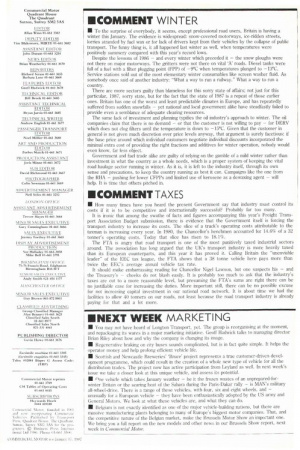"COMMENT WINTER
Page 5

If you've noticed an error in this article please click here to report it so we can fix it.
▪ To the surprise of everybody, it seems, except professional road users, Britain is having a winter this January. The evidence is widespread: snow-covered motorways, ice-ridden streets, lorries stranded by fuel wax or for lack of drivers kept from their vehicles by the collapse of public transport. The funny thing is, it all happened last winter as well, when temperatures were positively summery compared with this year's record lows.
Despite the lessons of 1986 — and every winter which preceded it — the snow ploughs were not there on major motorways. The glitters were not there on vital 'A' roads. Diesel tanks were full of a fuel with a filter plugging point (FPP) of —9°C when temperatures plunged to —13°C. Service stations sold out of the most elementary winter consumables like screen washer fluid. As somebody once said of another industry: "What a way to run a railway." What a way to run a country.
There are more sectors guilty than blameless for this sorry state of affairs; not just for this particular, 1987, sorry state, but for the fact that the state of 1987 is a repeat of those earlier ones. Britain has one of the worst and least predictable climates in Europe, and has repeatedly suffered from sudden snowfalls — yet national and local government alike have steadfastly failed to provide even a semblance of adequate clearing resources.
The same lack of investment and planning typifies the oil industry's approach to winter. The oil companies claim that there is no demand — or that the customer is not willing to pay — for DERV which does not clog filters until the temperature is down to —15°C. Given that the customer in general is not given much discretion over price levels anyway, that argument is surely facetious: if the base price around which individual customers negotiate individual discounts incorporated the minimal extra cost of providing the right fractions and additives for winter operation, nobody would even know, far less object.
Government and fuel trade alike are guilty of relying on the gamble of a mild winter rather than investment in what the country as a whole needs, which is a proper system of keeping the vital road haulage sector running in winter. As it is, it is left to the industry itself, through its own sense and precautions, to keep the country running as best it can. Campaigns like the one from the RHA — pushing for lower CFPPs and limited use of kerosene as a dewaxing agent — will help. It is time that others pitched in.
'COMMENT TAXES
• How many times have you heard the present Government say that industry must control its costs if it is to be competitive and internationally successful? Probably far too many.
It is ironic that among the swathe of facts and figures accompanying this year's Freight Transport Association Budget submission, there is evidence that the Government itself is forcing the transport industry to increase its costs. The slice of a truck's operating costs attributable to the taxman is increasing every year. In 1980, the Chancellor's henchmen accounted for 14.6% of a 32 tonner's operating costs. Today that slice has risen to 18.1%.
The ETA is angry that road transport is one of the most punitively taxed industrial sectors around. The association has long argued that the UK's transport industry is more heavily taxed than its European counterparts, and this year it has proved it. Calling Britain the "unenviable leader" of the EEC tax league, the ETA shows that a 38 tonne vehicle here pays more than twice the EEC's average annual vehicle tax rate.
It should make embarrassing reading for Chancellor Nigel Lawson, but one suspects his — and the Treasury's — cheeks do not blush easily. It is probably too much to ask that the industry's taxes are cut to a more reasonable level, but presuming the ETA's sums are right there can be no justifiable case for increasing the duties. More important still, there can be no possible excuse for not increasing capital investment in our national road network. It is about time we had the facilities to allow 40 tonners on our roads, not least because the road transport industry is already paying for that and a lot more.












































































